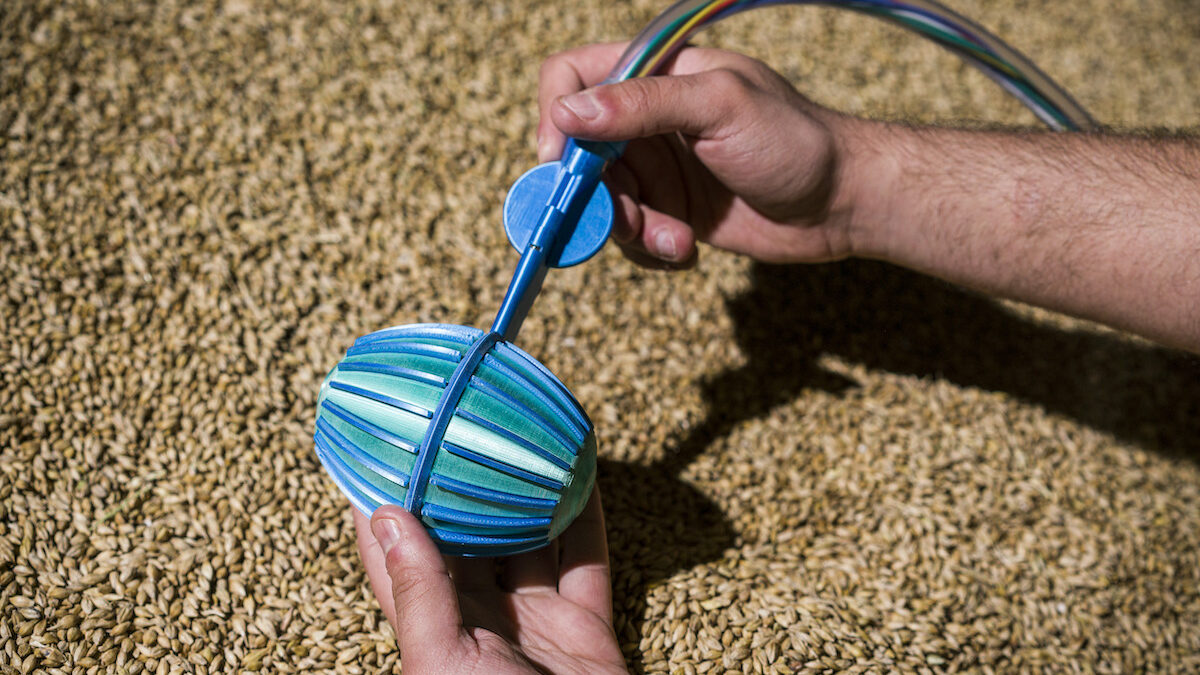A ‘grain-surfing’ robot called Crover is set to revolutionise global crop management after its inventors joined Scotland’s National Robotarium as part of ambitious plans to scale.
The t-shaped android can be deployed in grain silos to give farmers real-time insights into the conditions of their crops – enhancing quality and reducing waste.
Crops stored in sheds or silos have previously had to be tested by inserting spears into grain mountains – a laborious manual and potentially dangerous task.
Now, thanks to Crover – named after the Edinburgh agri-tech startup that came up with the idea – the robot is set to be exported around the world to improve global farming practices.
Lorenzo Conti, founder and managing director of Crover, said: “Traditional methods like spear sampling grain are time-consuming and laborious and quite often impractical and dangerous. In practice, grain storage operators are advised to sample bulk stacks at every 50 cm intervals. The reality is that, if done manually, someone could spend the best part of a week carrying out a single store check depending on the size of their crop load.
“Our device is designed to be controlled from one spot and saves whoever is operating it many hours of work as well as improving accuracy. The robot can ‘swim’ through the grain quickly generating a 3D map of temperature and moisture across the stack. This kind of insight can help people like farmers to better understand the condition of their grain and make informed decisions earlier like increasing ventilation or taking pest control measures.
“Working with the National Robotarium has significantly supported Crover’s development by providing us with access to state-of-the-art office and lab facilities and an extensive ecosystem of collaborators, industry experts and academic teams. It’s rare to be surrounded by a team who understand what it means to develop complex robots and we’re excited to continue sharing Crover’s journey with them.”
The company will be based at the National Robotarium, a brand new £22m facility at Heriot-Watt university that opened in September last year and aims to be a world-leading centre of excellence for robotics and artificial intelligence. Crover will benefit from the National Robotarium’s incubation facilities, state-of-the-art labs and engineering expertise.
Crover’s compact device has in-built moisture and temperature sensors and uses two domed-shaped wheels to propel itself through grain or other material in a bulk stack. It then feeds back analysis and data to a dashboard, giving users a more accurate understanding of the grain’s condition.
Temperature and humidity have a profound impact on grain storage and can contribute to the infestation of mould or insects which cause farmers to destroy significant portions of their stored crops. It is estimated that up to 30 per cent of commodity grain is lost from the supply chain globally every year as a result.
Steve Maclaren, chief operating officer at the National Robotarium, said: “The National Robotarium was launched with a mandate to assist all types of partners to accelerate research from laboratory to market, reduce cost and risk, increase opportunity and, ultimately, pave the way for the UK to take a global leadership role in AI and robotics technology.
“Innovations like Crover’s grain storage device – which could help solve a global problem for the world’s agriculture sector – are a great example of this mandate in action.
“The National Robotarium continues to be a leading collaborative hub, bringing together academics and global companies. Working with tenant companies like Crover, we want to provide a catalyst for entrepreneurship, and deliver sustainable economic benefit to the whole of the UK, its industries and society.”




